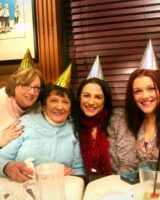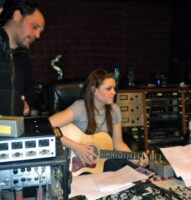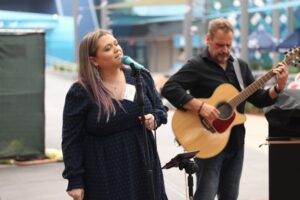My story begins when I was 15.
One night I randomly began hyperventilating and couldn’t stop. My mom had me breathe into a paper bag to try and stop it, but it didn’t work – nothing seemed to work. Eventually I agreed to go to the hospital. While we were in route, I started losing feeling in my extremities and eventually it went up to my face. I told my mom what was happening, and she pulled over into a fire station.
From there, I ended up being transmitted by ambulance to the emergency room. Thinking back to that day, it probably would have been a good idea to call an ambulance right away.
By the time we reached the Emergency Room I was completely paralyzed. I later learned that was due to hyperventilating and lack of oxygen. I can remember a nurse telling me that I was going to pass out if I didn’t calm down and a warm tear rolling down my cheek.
Eventually I started to calm down and return to normal.
It was the night before Easter, so it was pretty busy in the ER and the only room for me was a bed in the hallway.

After a couple of hours, the doctor came to see me. At this time, I had started going into another episode, so he immediately told the nurse to get me into a room and run an electrocardiogram (EKG). The EKG showed a prolonged QT interval. That is when a heart’s electrical system takes longer than usual to recharge between beats –so my heart would rest longer than it should to empty all the blood out of the chamber. Which made a lot of sense looking back, because I used to tell my mom sometimes that I felt like my heart stopped, and she would be so confused and just say “Katie, you’re standing and walking, you’re fine.” Granted I was the kid who always had an “injury,” so I can’t blame her.
Anyway, the EKG reading lead them to do an ultrasound and the results of the ultrasound found that I had a hole in the middle of all four chambers. The blood was leaving my heart the same way it was going in, only half of my blood was getting oxygenated, and the left side of my heart was enlarged. I was told that the hole was so big the blood was flowing freely through it, which is why my doctors never heard a heart murmur.
After my 16th birthday I met with the surgeon who told me that he was shocked I was even sitting on his couch with all of the activities I was involved in. He ultimately told me that I needed to have open heart surgery, or I would die in 13 years, either by a heart attack or a stroke.

My singing has always been number one in my life, and without it I honestly don’t know who I’d be. So, without hesitation I looked him in the eyes and told him that if he couldn’t promise me, I’d be able to sing after surgery I’d rather die in 13 years than to never be able to sing again. He was floored. But you see, if the breathing tube had hit my vocal cords the wrong way, I would never be able to sing again. So, it took a lot of convincing on his part!
My chart was marked all over the place that I was a vocalist, and he used a child size breathing tube for the surgery. He promised me that if I could respond to commands in the recovery room they would remove my breathing tube in the recovery room, which he told me is unheard of.
I am happy to say that all went according to plan. I had the surgery, and I am healthy now with no restrictions, except a follow up with my cardiologist once every three years.
And the best part is I’m still singing and performing. I am forever thankful to the doctors, nurses, and family that helped get me through this life changing event. I am also thankful to the American Heart Association and those who support their mission. The research that has been funded for close to 99 years has contributed to breakthrough advances, and provided protocols that saves lives like mine.

